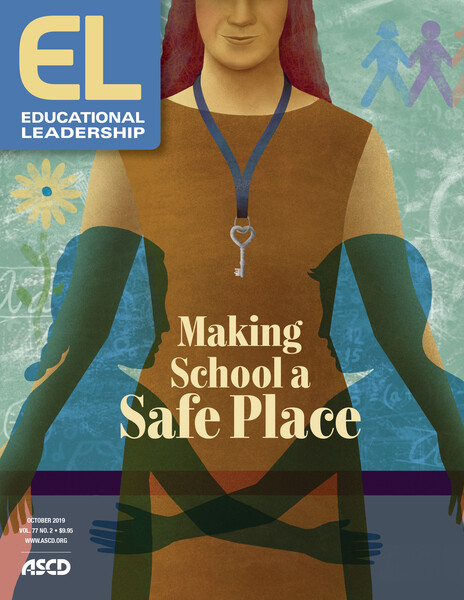A psychologically safe climate for adults requires vulnerability.

Premium Resource
Let's talk about the team meeting you led that left everyone feeling confused. The lesson you modeled that flopped. The student you couldn't reach. The parent who continues to be angry with you. Most leaders would rather not think about these incidents, much less talk about them with staff. They might worry it will shake others' confidence in them as a leader, make them look bad, or just be embarrassing. Yet, in the right climate, these incidents are opportunities for strengthening professional capital.
For principals, instructional coaches, and teacher leaders alike, school leadership is complex and uncertain work. It is both a science and an art. Research and articles about best practices are helpful guidelines, but ultimately school leaders must make swift and difficult decisions about situations in which the path between cause and effect may be inconsistent and unclear. We use our professional judgement to make our best guess. Sometimes we hit the target; occasionally we miss it. Then what? Some leaders don't look back. Other leaders—if they've created an environment of psychological safety—tap into their team's expertise and reflect with them on the impact of their decisions. Discussing such experiences grows collective knowledge. It grows professional capital.
According to Harvard business professor Amy Edmondson, psychological safety is present when individuals feel like they can speak up about their concerns and mistakes without fear of retribution and with comfort in the assumption that they will be given the benefit of the doubt. In such climates, peers and coworkers not only view candid contributions as helpful, but as required, given their shared commitment toward a common goal.
Professional capital is present when educators are able to benefit collectively from the impact of each individual's expertise (human capital), collaborative skill (social capital), and professional experience (decisional capital). In too many school settings, educators hide their talents for fear of being volunteered for something; they resist collaboration out of a concern that it will be a waste of their effort; and they spend time in their classrooms trying to invent strategies to address challenges that are common to their colleagues. Putting themselves out there feels too risky. A climate of psychological safety, however, allows educators to view the risks as worth the reward of strengthened professional capital.
There are several reasons why it can be challenging for educators to embrace a mindset that invites vulnerability and risk taking. First, for centuries, society has perpetuated the view of the teacher as the one with the answers. This societal expectation can make it especially hard for educators to utter the words "I don't know."
Second, educators, as professionals, feel the duty of care. We feel responsible for those entrusted to us and this can cause us to be risk-averse. We may even tell ourselves that we are confident about the outcomes of our decisions, when the nature of our work makes them nearly impossible to predict.
And a third reason is our real and perceived hierarchical relationships. These relationships, including how they intersect with race and gender in schools, can influence educators' willingness to make themselves vulnerable, admit mistakes, and believe they will be given the benefit of the doubt.
In order to supersede these challenges and create a climate of psychological safety, educators need new language, habits, and practices. Teacher leaders and principals can best establish these together.
By virtue of their position, principals are able to create a vision that reflects a schoolwide commitment to building professional capital, protect the time for conversations about it, and secure resources, such as speakers or touchstone texts, that give the faculty new language as they share their experiences around decision making. It's also important that principals demonstrate a commitment to risk taking themselves and model admitting when they don't know something, which elevates these practices. We might, for example, hear principals and other leaders invite colleagues into decision making ("My current thinking is … "), recognize their own challenges ("One thing I often miss and could use your help with is … "), or view the situation from another perspective ("I need help seeing how I might be wrong … ").
Teacher leaders can accelerate culture building throughout the school, starting with their own teams. They might make their vulnerability visible through their willingness to invite consultation when they are less than confident, to discuss challenges, and to reflect with others on the purpose and impact of changes they have made. Even discussing strengths and successes can sometimes feel risky, but it is important for all teachers to become more comfortable doing so. The ability of teacher leaders to support colleagues in this shift is aided by their role-alike relationship and keen understanding of what makes the change hard.
A school climate that has been shaped by teacher leaders and principals to support vulnerability and risk taking has an important foundation in place. But the ultimate goal isn't for individuals to admit mistakes. It's for the organization to learn from them. Educators must commit, then, to collaborative inquiry and reflection so that lessons can be gleaned, shared, and applied throughout the organization.
Most educators are willing to share a lesson that went well, a successful team meeting, or a crisis that was averted. Until we feel safe enough to talk about the lesson that flopped, the exchange that left us speechless, or the decision that was—now in retrospect—clearly the wrong one, we cannot capitalize upon the benefit of those experiences for strengthening our school's professional capital. It is safe to say that if school leaders can do so, their students will be the beneficiaries of better decisions and stronger schools.
End Notes
•1 Edmondson, A. (2018). The fearless organization: Creating psychological safety in the workplace for learning, innovation, and growth. Hoboken, NJ: Wiley.
•2 Hargreaves, A., & Fullan, M. (2012). Professional capital: Transforming teaching for every student. New York: Teachers College Press.
•





